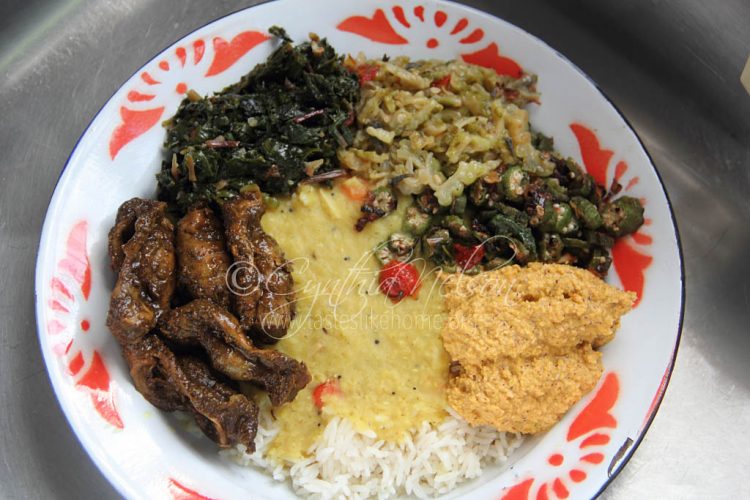 The other day, in preparation for a meal, I assembled some things on my plate that I did not cook, deliberately to be eaten together. On my plate were sauteed (fried) okra with coconut, roast chicken and tostones (twice fried green plantains). These were dishes available and I thought I’d have them together. While they worked as a balanced meal of starch, protein and vegetable, they missed the mark in taste, because combined, they tasted a little too salty for my liking. I couldn’t really taste the flavour of anything as I ate and did not enjoy my meal. On their own, each dish was properly seasoned but together, especially given that I did not cook them to be eaten as a composed dish, the seasoning (salt) was off-putting.
The other day, in preparation for a meal, I assembled some things on my plate that I did not cook, deliberately to be eaten together. On my plate were sauteed (fried) okra with coconut, roast chicken and tostones (twice fried green plantains). These were dishes available and I thought I’d have them together. While they worked as a balanced meal of starch, protein and vegetable, they missed the mark in taste, because combined, they tasted a little too salty for my liking. I couldn’t really taste the flavour of anything as I ate and did not enjoy my meal. On their own, each dish was properly seasoned but together, especially given that I did not cook them to be eaten as a composed dish, the seasoning (salt) was off-putting.
Has that ever happened to you with combinations of things you make to be eaten together?

This recent experience reminded me of a time when some friends and I gathered for a sumptuous meal of dhal, rice, vegetables, bunjal shrimp and fried salt fish, all to be eaten in the style of 7-curry. Someone in the group commented that whenever they cook a meal to be eaten mixed like we were having, that they sometimes do not get the salting right. In other words, when everything is mixed together – dhal, rice, veggies etc., the food tastes a little rich in salt. Can you relate?
The same experience of food tasting salty can be had when some dishes are mixed and eaten together, for example, mashed potatoes and gravy, or a dish of pasta with any type of sauce. Have you ever made the mistake of adding too much salt to your bread or roti only to find them assertively salty when eaten with accompaniments? It’s a balancing act when it comes to salting (seasoning) food designed to be served/eaten as a composed dish.
Here’s some advice for all of us to remember.
Whenever dishes are made to be eaten together – in combination with one another – then the salt we add to each component, as it is cooked, has to be less than what would be considered “normal”, as in salt-to-taste. If the salt is not reduced for each component, when mixed to make a fork, spoon or mouthful, our palates are hit with an enhanced degree of salinity, dulling the actual flavour of the food. Not too long after a few mouthfuls, our palates – saturated and heavy – seek respite with water or something plain, bland.
Each component of a composed dish must be able to stand alone, and by that I mean that you should be able to eat each component, taste and enjoy the flavour. The food should be slightly under seasoned (under salted) but not so much that you draw back and exclaim, “This needs salt”. Having each part of the dish not fully seasoned (salt to taste) guarantees that when it is mixed, paired, swirled or stacked with other parts/components of the dish, each bite will be a perfect union of flavours. What this means is that we should taste each component as we cook. Consider this the next time you are making a combo meal like dhal and rice, with things like salted fish, veggies and curries, cook so that each dish tastes good on its own but that it can also pair and marry well with the other parts of the meal.
The same balancing act should be employed when components of a single dish must be prepared/cooked separately before forming the union of a dish. Let’s take a dish of Macaroni & Cheese for example, aka Macaroni Pie. The pasta must be seasoned, but only so much that when it absorbs and cooks in the savoury cheese sauce, and the two become one, you have a pie that keeps them coming back for more. I recommend that you taste the water after you have salted it before adding the pasta to cook. And please, ignore the advice that the pasta water needs to be as salty as the ocean. This advice holds true for whenever you are making any pasta dish, always remember that you are going to be another component that in itself needs to be seasoned and that you may be topping with a salty cheese. Another dish to consider with balancing salt is Shepherd’s Pie as the mash and the meat sauce though seasoned separately must be balanced when combined for the pie.
Cooking minced meat can be tricky when it comes to seasoning. Well versed home cooks and chefs recommend cooking a little of the seasoned meat in a pan, tasting, and then adjusting the seasoning. Follow the advice, it works. Believe me.
To consider the point further, think of how we use roti (plain/paratha) and boiled rice to accompany our stews, veggie and curry dishes. Actually, add boiled ground provision too. All of these things – roti, rice and ground provision – function as a plain base for the richly seasoned accompaniments, especially when cooked to have a sauce or gravy.
So, when cooking, always consider how you plan to serve the meal or rather, how it should, and most likely will be eaten, and adjust your seasoning (salt) to suit.
Cynthia









